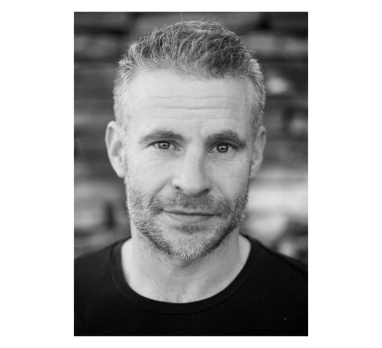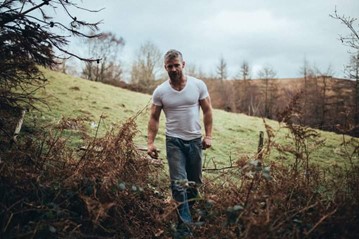Hugh James meets Mikey J Allen, who was crowned ‘Welsh Veteran of the Year’ and ‘Inspiration of the Year’ – at the 2021 Welsh Veterans Awards, which Hugh James proudly sponsors.
Now a Director with Endex Support Services, Mikey shares his inspirational story.
Here, in the first part of our series, Mikey talks to Paul Spiteri, an Associate in our Military Department, about his experiences in the British Army, his tour of Afghanistan and coping with his adversely affected mental health on his return home.

I joined the army when I was 27 years old. I’ve always been physically fit, and at the time of joining up, I had been running 20 miles on some days and doing approximately 10,000 press ups a week. Within six months of signing up, I was scoring straight A’s; won best recruit at intake and joined The Second Battalion of the Royal Welsh Regiment of the British Army.
Within my first year with the Regiment, I qualified as a physical training instructor (PTI). Additionally, when soldiers would complete physiotherapy, they would come to us to finish their rehabilitation back to full fitness. I also taught mainstream PT lessons for B (Rorkes Drift) company, Infantry Battalion. On a personal note, I settled into married life in the army and had two children.
In 2011, I went on a frontline tour of Afghanistan for almost 7 months. We were stationed in a Platoon base, which was a 45-minute drive from Lashkar Gah, sharing the compound with the Afghan national police. My own role was predominantly as pointman – the man at the front of a patrol whose responsibility was to detect and confirm IED’s. This was in addition to the regular duties that come with an active front line tour.

We were involved in contacts with the enemy several times a week for the first few months.
Throughout these encounters, the Afghan police were always a great support to us. Our relationship grew over our time there, fighting and living alongside together. We came to see each other as family and as such were extremely protective of each other.
Thankfully we all came home from this tour by unimaginable levels of luck – although there were life changing Injuries and many of the boys have not really returned the same.
On our return, things weren’t quite the same for us, especially I felt for me. There’s a phrase I learnt which is that “it’s like you didn’t come back with your soul”. This really rings true for me. I guess some people don’t come back as happy as they once were, or even as the same people who went out and tend to find coping mechanisms for their stresses and anxieties that changes their character.
After my tour of Afghanistan, as well as my mental problems, I also sustained a back injury and couldn’t train anymore. This also meant I couldn’t give PTI lessons or even play with my children. I was in constant pain and on painkillers for a long time and that’s when I tried taking an overdose. I didn’t tell anybody about it for a very long time, but after that there was another change in my character. I just became completely self-destructive and on a downward spiral.
I struggled with this for many years and, ultimately, I ended up homeless. Having left the army in 2015, my marriage broke down, I was directionless and homeless from 2016 until 2018.
I sofa-surfed during this period, but I was predominantly living in a log cabin I built by hand off the beaten track near a village called Wattsville, in South Wales.

The cabin was fairly remote. Nobody knew where the cabin was and there was no reason for anybody to ever walk past it, even by accident. I began to feel re-energised: I had complete freedom and the opportunity to build something with my own hands, re-engage with fitness and have achievable goals every day – even something as simple as carrying a heavy log across a field. It was extremely beneficial to my wellbeing. And, at the same time, being away from mobile phones, radio and tv meant it was just like being back to complete basics, away from the stresses and strains of the modern world: a simpler way of life.
Although I enjoyed living out of the cabin, there were times of extreme starvation, which was difficult to handle. Sometimes I was living off as little as a packet of oat cookies and drank water from the outdoor water taps in people’s back gardens. Occasionally, I would go to the local shop to get a reduced sandwich at night-time.
Needing money to feed myself, I got myself back into employment, working as a labourer. I knew only too well though that I still had issues that needed to be dealt with, so I got myself into counselling too. These counselling sessions helped improve my train of thought, but even when working I would still suffer with random flashbacks about my time in Afghanistan.
I distinctly recall one time when I was working on a building site with some others on a wet day. I was following a digger in front of us; walking within the tracks it had left in its wake. I suddenly froze, alarm bells went off in my head and I was immediately fearful that my friends working alongside me were about to die, as they weren’t walking within the tracks. You see, when we were in Afghanistan, we would tend to follow in the tank tracks, because if there was an improvised explosive device (IED) in the ground, the tank would trigger it when it drove over it, so there was safety for us when walking in its tracks.
It was the most bizarre feeling. I could see there was nothing wrong whatsoever. I was on a building site back home in Wales and everybody was laughing and smoking cigarettes, but the emotions and the response my body was going through put me right back there in Afghanistan and as far as I was concerned, we were about to be attacked with an explosion.
Although I was physically fit, making healthy dietary and lifestyle choices where possible, managing myself as best as I could, the smallest thing could trigger a flashback at any time, and without warning. I found I could never completely protect myself from it. The day with the breakdown behind the digger was unfortunately my last day at work. I just didn’t go back after that. In time I would learn that I had developed PTSD or post-traumatic stress disorder.

Instead of working, I decided to devote more time to building and improving the cabin, which was becoming more homely every time I worked on it.
Little was I to know, though, that fate had other things in store for me…
Join us for the second part of Mikey’s story, when he has to re-evaluate his life and rebuild his home.
For more information about Endex, the charity Mikey set up to help rehabilitate veterans and support their mental health, please visit:
- Endex Facebook: https://m.facebook.com/endexcommunity/
- Endex Go Fund Me page: https://www.gofundme.com/f/EndexSupportServices
If you have thoughts of suicide, confidential help is available for free at the National Suicide Prevention Lifeline UK. Call 0800 689 5652. The line is open 24 hours every day.
Legal services:
As well as treatment for the condition, victims of PTSD may be entitled to make a claim for compensation. This can be by way of a Government payment under the Armed Forces Compensation Scheme or War Pension Scheme, or via a civil claim for compensation. For further information on the AFCS and War Pension claim visit the gov.uk website.
Many veterans may not be aware that they are entitled to bring both types of claim. If one claim is turned down, this doesn’t mean the other claim is bound to fail. Veterans should ensure they seek expert advice about their entitlement to bring a claim.



